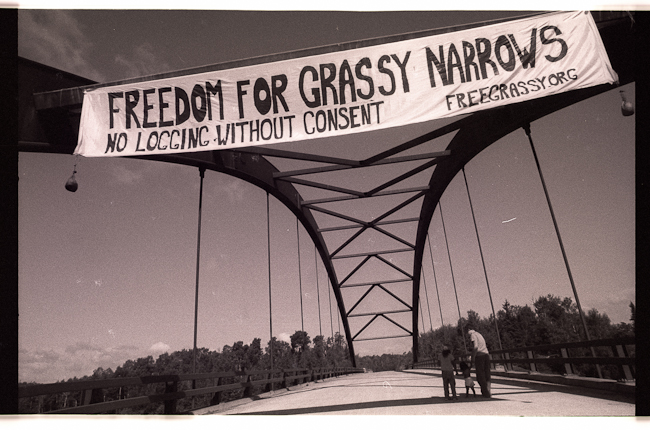Ontario’s new plan for clearcut logging at Grassy Narrows looms

Ottawa - Today the Supreme Court of Canada will hear Grassy Narrows’ legal case for treaty rights and against clearcut logging. The case challenges Ontario's jurisdiction to unilaterally award logging and mining licenses on a vast tract of Treaty 3 lands north of the English River (the Keewatin Lands). The case, called Keewatin v. MNR, has been winding its way through the courts for fourteen years.
In Treaty 3, signed in 1873, Canada promised to respect the right of the Ojibway to hunt and fish in their territory.
However, Ontario continues to plan for clearcut logging throughout Grassy Narrows’ Territory that will seriously limit Grassy Narrows’ rights, and has finalized a new 10 year Forest Management Plan for Grassy Narrows’ Territory that includes numerous large clearcuts permitted by Ontario against Grassy Narrows' will. The new plan was scheduled to take effect in April 2014, but has been delayed due to a request for environmental assessment and widespread opposition including by grassroots Grassy Narrows youth and Ontario Regional Chief Beardy.
“We hope the Supreme Court will agree that the original intent of our Treaty with Canada must be upheld to protect our way of life,” said Chief Roger Fobister Sr. of Grassy Narrows.
Scientific studies indicate that clearcut logging in boreal watersheds often raises mercury levels in fish above the World Health Organization’s advisable limit for human consumption. Recent clearcut logging in Grassy Narrows’ territory has likely deepened and prolonged the terrible impacts of mercury poison that began when a paper mill upstream in Dryden dumped 9,000 kg of mercury into Grassy Narrows' river between 1962 and 1970.
“Our community has suffered for too long from the impacts of industry imposed by Ontario on our people,” said Joseph Fobister, one of the Grassy Narrows trappers who initiated the case. “We cannot allow industry to further damage our way of life and our health by poisoning our water and destroying the forests that we depend on.”
In her 2011 ruling in favour of Grassy Narrows, Ontario Superior Court Justice Sanderson had harsh words for Ontario’s approach to Treaty rights: “Ontario's approach to this litigation, while pleasantly civil, was strongly adversarial. Always focusing on its own proprietary rights, it downplayed the plain and clear reference in the Harvesting Clause to Canada. It characterized as a "mistake" what I have found to be [the Treaty Commissioners’] deliberate attempt to protect the Harvesting Rights of the Ojibway…” [1603]
On March 18, 2013 The Ontario Court of Appeal overturned Justice Sanderson's ruling.
The Supreme Court has an opportunity in this case to give the people of Grassy Narrows a real say in their future and breathe life into the promises made by the Crown in 1873," said Robert Janes, lawyer for Grassy Narrows. "All we are asking is that the courts recognize and affirm the duty that the federal government has to ensure that the promises it made to make peace with the Ojibway are truly honoured."
Contact:
Joseph Fobister: 807-407-2745
Ramsey Hart: 613-298-4745
Robert Janes: 250-888-5269
More information: http://freegrassy.net/2014/05/11/grassyscc/